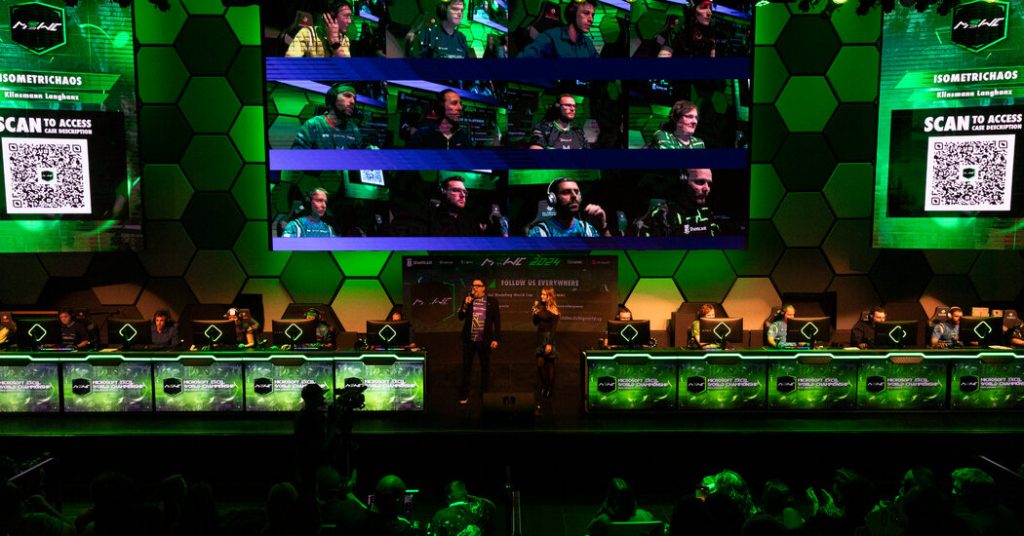The Microsoft Excel World Championship, a surprisingly captivating event, transformed the mundane spreadsheet software into a stage for fierce competition and unexpected celebrity. Held in a Las Vegas e-sports arena, typically home to video game tournaments, the championship saw twelve finalists emerge from a glowing “hype tunnel,” adorned in sponsored jerseys, to face a crowd of 400 and a live ESPN3 audience. These financial professionals, fluent in the language of formulas and functions, were treated like sporting heroes, vying for a $5,000 prize, a championship belt, and the coveted title of world’s best spreadsheeter. The organizer, Andrew Grigolyunovich, a Sudoku champion, envisions a future where competitive Excel becomes a mainstream e-sport, with million-dollar prizes and global recognition, elevating these “regular job” individuals to stardom.
The event drew enthusiastic spectators like Erik Oehm, a software developer who likened the championship to the “Super Bowl for Excel nerds,” a chance to witness the equivalent of LeBron James and Kobe Bryant in the spreadsheet world. These spreadsheet titans were embodied by Diarmuid Early, a financial consultant from Ireland, and Andrew Ngai, the reigning three-time champion from Australia, known as the Annihilator. The palpable tension between the friendly rivals mirrored the intensity of any high-stakes sporting event. Mr. Early, confessing to taking the competition “too seriously,” and Mr. Ngai, preparing with “focus music,” highlighted the dedication and pressure these competitors faced.
The final round presented a formidable challenge, modeled after the online role-playing game World of Warcraft. The finalists were tasked with designing intricate Excel formulas to track the vital signs of 20 avatars, a task detailed in a seven-page instruction booklet. With the precision of seasoned athletes, they adjusted their columns and queued up their focus playlists. The 40-minute competition commenced with a countdown, and the players plunged into a flurry of formula entries. The audience watched with bated breath as cascading answers filled the spreadsheets, Mr. Ngai initially taking a commanding lead, only to stumble on a problem, allowing Michael Jarman to surge ahead. The tension was electrifying.
The evolution of the spreadsheet from VisiCalc, the first electronic spreadsheet, to Microsoft Excel, with its over 400 million users, speaks to its powerful versatility. Excel’s potential extends far beyond financial planning, encompassing everything from dating organizers to tracking global pandemics. Bob Frankston, a VisiCalc founder, views the spreadsheet as a “mirror” of the mind, a reflection of its user’s thought processes. Yet, for many, Excel remains a tool for completing corporate tasks, a reminder of the daily grind. The irony that the instruments of our work also become the basis of our play is perhaps a poignant commentary on modern life.
The history of competitive Excel traces back to ModelOff in 2012, which focused on complex financial problems. Mr. Grigolyunovich, a former ModelOff competitor, sought to inject more excitement into the format, creating the Financial Modeling World Cup and its flagship event, the Excel championship. He incorporated elements of traditional sports, like shorter rounds, eliminations, commentators, and the pre-game “hype tunnel,” to heighten the drama and attract a wider audience. While some competitors found the theatrical aspects slightly absurd, they embraced the fun and the potential to elevate competitive Excel to the level of other e-sports. Mr. Grigolyunovich’s ambitious vision includes larger audiences, bigger sponsors, and a million-dollar grand prize, hoping to propel the championship from ESPN’s obscure sports showcase to a mainstream spectacle.
The competitors in Vegas, while acknowledging the importance of Excel proficiency, emphasized the significance of problem-solving skills, composure, and even luck. The live audience added an unpredictable element, transforming the competition into a true sporting event, albeit one lacking in physical exertion. While some hoped for more rivalries to enhance the drama, the competitors remained largely friendly and supportive, perhaps hindering the development of compelling narratives. Yet, the emergence of minor celebrities like Mr. Early and Mr. Ngai, who were bombarded with selfie requests, hinted at the growing popularity of competitive Excel. Ultimately, Mr. Jarman’s victory, marked by a leap of joy and a shower of glitter, underscored the passion and dedication of these unlikely athletes, proving that even spreadsheets can inspire intense competition and unexpected thrills.


